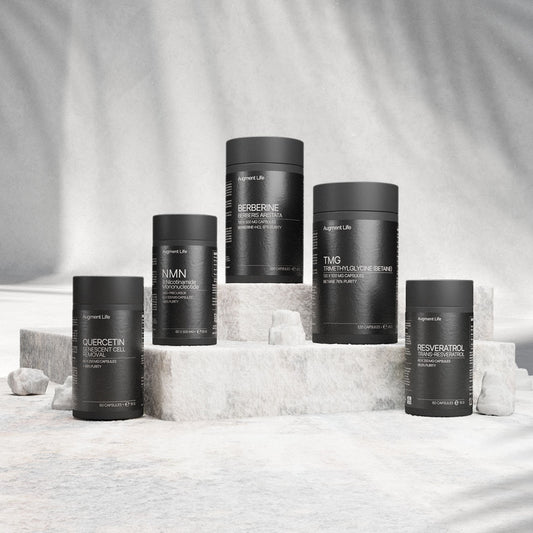Whether you're contemplating taking berberine for metabolic support or overall wellness, understanding how to take it is crucial for harnessing its full potential. This article will explore best practices and tips on incorporating berberine into your daily routine.
Keep reading and find out what is the best time to take berberine, which forms of berberine exist, and how to incorporate berberine supplements into your lifestyle.
1. Choose the Right Formulation
Selecting the right form of berberine is the first step. Common formulations include berberine hydrochloride and berberine sulfate.
In addition, some formulations may have higher bioavailability than others. Research has shown that combining berberine with cinnamon may increase its bioavailability.1
Consider consulting with a healthcare professional to determine which type suits your needs best.
2. Timing Matters
Take berberine with meals to enhance absorption and minimize the risk of gastrointestinal discomfort.2 Also, splitting the daily dosage into multiple smaller doses throughout the day may also be beneficial.
3. Monitor for Side Effects
While berberine is generally safe, some individuals may experience mild side effects like:
- diarrhea,
- constipation,
- bloating.3
If these persist, consider adjusting the dosage or consulting a healthcare professional.
4. Consider Interactions with Other Drugs
While research is limited, berberine may interact with the following medications:4
- Cyclosporine: Berberine may decrease how quickly the body breaks down cyclosporine (a medication that reduces immune response), increasing its side effects.
- Diabetes medications: Berberine may decrease your blood sugar levels. When combined with diabetes medications, it may cause your blood sugar to drop too low.
- Blood pressure medications: Since berberine may lower blood pressure, combining it with blood pressure medications may cause an unsafe drop in blood pressure.
- Robitussin DM (Dextromethorphan): Berberine may reduce your body's ability to break down dextromethorphan, increasing its effects and side effects.
- Blood thinners: Berberine may slow blood clotting. Taking it alongside blood thinners may increase the risk of bruising and bleeding.
Berberine also has the potential to interact with herbs and other supplements that affect blood clotting, blood sugar levels, or blood pressure.
If you take prescription medications or dietary supplements, talk with your healthcare provider to ensure no potential interactions occur.
5. Combine with a Healthy Lifestyle
Berberine complements a healthy lifestyle. Incorporate it into a balanced diet and regular exercise routine for maximum benefits.5-6
Final Words
Berberine consumption involves a holistic approach that considers various factors, from the type of formulation to your individual health goals.
By selecting the right berberine supplement, following dosage recommendations, and incorporating it into a healthy lifestyle, you can maximize its potential benefits.
Remember, the key to success lies in consultation with healthcare professionals, gradual adjustments, and consistent monitoring. With these strategies in place, you can confidently embark on your journey toward better health through the effective and mindful use of berberine.
Dive deeper into our supplementary articles to gain more insights into berberine:
References:
- Huang, Z., Lu, F., Dong, H., Xu, L., Chen, G., Zou, X., & Lei, H. (2011). Effects of cinnamon granules on pharmacokinetics of berberine in Rhizoma Coptidis granules in healthy male volunteers. Journal of Huazhong University of Science and Technology. Medical sciences = Hua zhong ke ji da xue xue bao. Yi xue Ying De wen ban = Huazhong keji daxue xuebao. Yixue Yingdewen ban, 31(3), 379–383. https://doi.org/10.1007/s11596-011-0385-4.
- Ren, F., Shou, J., Zhao, Z., He, C., Ma, C., Huang, M., Fu, J., Tan, X., Li, X., Wen, B., Chen, X., Yang, X., Ren, G., Lin, Y., Chen, Y., You, X., Wang, Y., & Jiang, J. (2015). Transforming berberine into its intestine-absorbable form by the gut microbiota. Scientific Reports, 5(1). https://doi.org/10.1038/srep12155
- LiverTox: Clinical and Research Information on Drug-Induced Liver Injury [Internet]. Bethesda (MD): National Institute of Diabetes and Digestive and Kidney Diseases; 2012-. Berberine. [Updated 2020 Oct 6]. Available from: https://www.ncbi.nlm.nih.gov/books/NBK564659/.
- Berberine: MedlinePlus Supplements. (n.d.). https://medlineplus.gov/druginfo/natural/1126.html.
- Lan, J., Zhao, Y., Dong, F., Yan, Z., Zheng, W., Fan, J., & Sun, G. (2015). Meta-analysis of the effect and safety of berberine in the treatment of type 2 diabetes mellitus, hyperlipemia and hypertension. Journal of ethnopharmacology, 161, 69–81.
- Dong, H., Wang, N., Zhao, L., & Lu, F. (2012). Berberine in the treatment of type 2 diabetes mellitus: a systemic review and meta-analysis. Evidence-based complementary and alternative medicine : eCAM, 2012, 591654. https://doi.org/10.1155/2012/591654.








